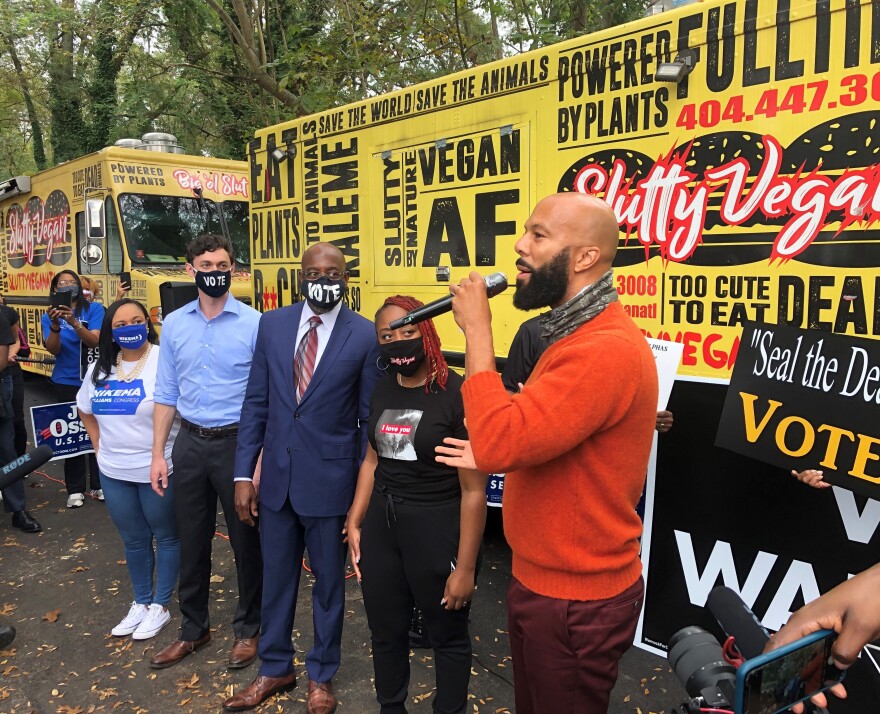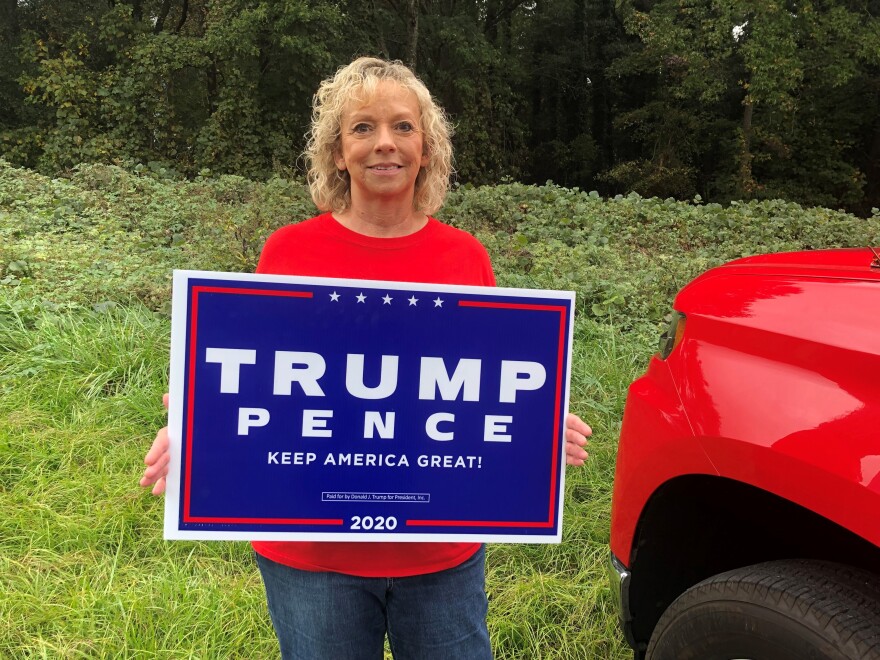How conservative do you have to be to keep a Georgia Senate seat?
"More conservative than Attila the Hun," is what incumbent Republican Kelly Loeffler advertises.
Georgia Gov. Brian Kemp appointed Loeffler to replace Republican Sen. Johnny Isakson who resigned at the end of last year, citing health reasons. Now she's running in a crowded special election to serve out the remaining two years of Isakson's term.
Loeffler is a wealthy businesswoman and political donor with no prior political experience. She's the former CEO of a subsidiary of Intercontinental Exchange, owned by her husband. And she co-owns the WNBA franchise, the Atlanta Dream.
But out on the campaign trail in Buford, Ga., Loeffler wears jeans and a red checkered shirt, playing up her rural roots growing up on her family's farm. She promises to deliver on conservative values — curtailing abortion, for instance, and calling for law and order.
"I will always fight for the unborn, and I will always stand up against the radical left and the cancel culture," she says. "You can see what's happening in our country today. You've got anarchy. You've got mob rule."
She's critical of Black Lives Matter, and objected to the WNBA's support for the movement, calling for players to instead have U.S. flags on their jerseys. She talks about it in her campaign speech.
'Trusted Trump defender'
"I was the only sports team owner to speak out on this particular issue," Loeffler says. "And for that, it was suggested I should lose my team, my business, my seat in the Senate."
Loeffler's biggest argument is that she's with President Trump 100%. Then, she takes aim at the other top Republican on the ballot, Congressman Doug Collins of north Georgia.
"He's one of the most liberal republicans in the House of Representatives," Loeffler alleges.
For his part, Collins argues he's the "trusted Trump defender" in Congress, and uses a campaign ad to play up a Loeffler financial scandal.
"She's desperate to hide the fact that as the owner of the New York Stock Exchange, she spent $30 million trying to buy a Senate seat," Collins says in the ad. "After a private coronavirus briefing, she dumped millions in stock. She profited off a pandemic while too many Georgians lost everything."
'Focused on the voters of Georgia'
But this is no party primary. It's an open election with 20 candidates from all parties on the ballot in a year where Democrats have hope that Georgia is now swing state territory. Both presidential candidates have campaigned here recently, a rarity in a state where Republicans have long dominated federal races.
The GOP battle between Loeffler and Collins clears a path for the top Democrat in the Senate contest, Raphael Warnock.
"The other side is having an interesting little fight," Warnock says. "We'll let them take care of that, and I'll be focused on the voters of Georgia."
Warnock is the well-known Black pastor of Atlanta's storied Ebenezer Baptist Church, where Martin Luther King, Jr. preached.
Democrats see an opportunity to flip Georgia in part because the state has added more than a million new registered voters since 2016. And nearly two thirds of them are people of color. Now the party is trying to make sure they actually vote.
At a GOTV event last Tuesday in predominantly African-American Jonesboro, Ga., local politicians chanted "seal the deal, go vote" ahead of speeches from the rapper Common and Democratic Senate candidates Jon Ossoff, who is challenging Republican incumbent David Perdue, and Raphael Warnock.

"We say to America, witness the new south," Warnock tells the crowd.
"Georgia is the tip of the spear of a new south that is more inclusive, that is bold, that is forward looking."
Warnock says he wants to expand Medicaid, and remove barriers to voter participation. He supports Black Lives Matter.
"Kelly Loeffler may have the privilege of playing politics with this issue," he says. "But I come from a community where the issue of police brutality is real and it's a matter of life and death."
Picking up lunch nearby, flight attendant Nicol Harris says she voted for Warnock because she likes the idea of a pastor instead of more divisive politics.
"We need some change," she says. "There's no compassion for anybody or anything. And that's not what we're built on. That's not what we're about."
If no one gets more than 50% of the vote, the Georgia Senate race will advance to a runoff in January.

Rep. Doug Collins' supporter Debbie Dooley says if he doesn't make it, and Loeffler is on the ballot, she will sit it out, and risk a Democrat winning.
"I just can't vote for her," says Dooley, president of the Georgia Tea Party. Dooley has come to a street corner outside Joe Biden's rally in Atlanta to wave Trump flags at passersby.
Dooley says she's been a Republican activist since the 1970s, but won't vote her party at all costs.
"If she's in the runoff, I can't vote for a Democrat," Dooley says. "But I just can't vote because if you vote for the lesser of the evils, you're still voting for evil."
Copyright 2020 NPR. To see more, visit https://www.npr.org. 9(MDAxMzY2MjQ0MDEyMzcyMDQ5MzBhZWU5NA001))




